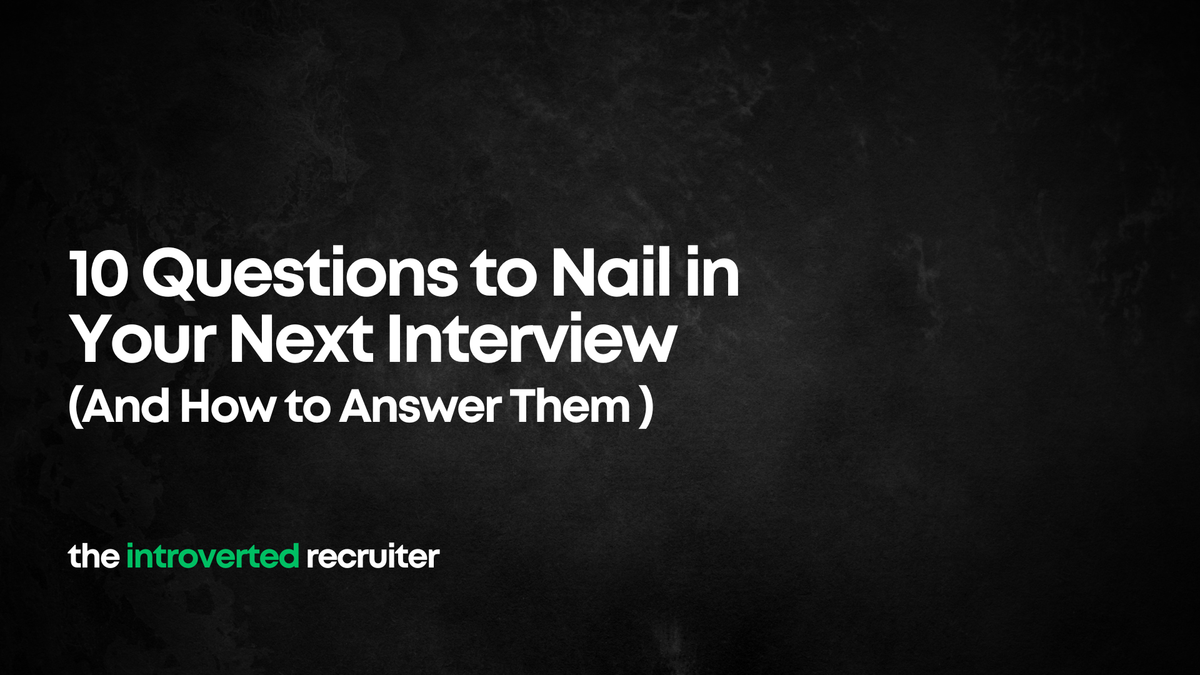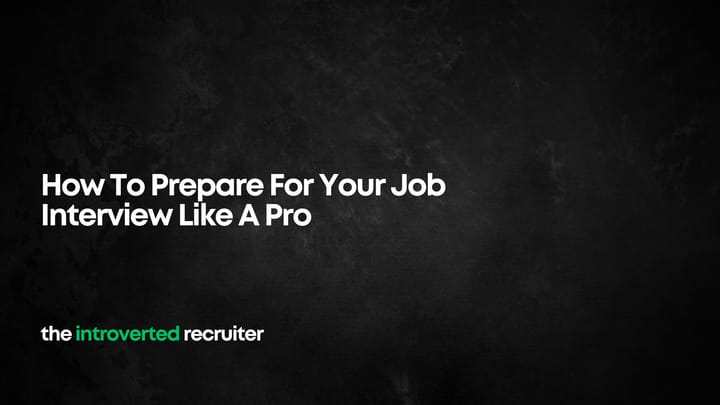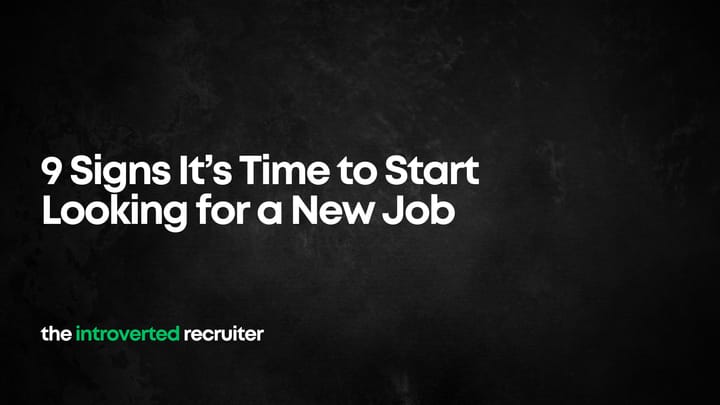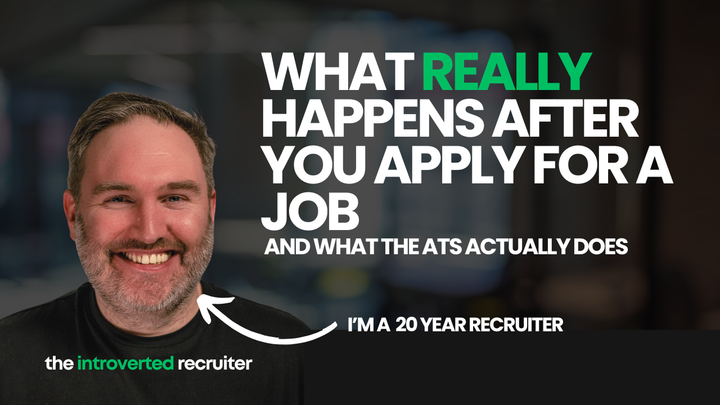10 Questions to Nail in Your Next Interview
(And How to Answer Them)

When it comes to interviews, most people wing it—and it shows. But here’s the thing: interviews aren’t about luck. They’re about preparation. The difference between getting the job and being another “we’ll keep you in mind” is knowing how to answer the questions that matter. The ones designed to test your experience, your problem-solving, and yes, even your nerves.
What if you could walk into your next interview knowing exactly what they’ll ask, why they’re asking it, and how to answer so you leave them thinking, We need this person on our team?
This isn’t about memorising scripts or delivering robotic answers. It’s about understanding the purpose behind these questions and crafting responses that feel authentic, confident, and aligned with what they’re looking for.
Here’s what you’ll get in this article:
- The 10 Most Asked Interview Questions: From “Tell me about yourself” to “What’s your greatest weakness?”, we break down the classics and why they matter.
- How to Use the STAR Technique: Learn how to structure your answers to behavioural questions like a pro—because “I just work hard” isn’t cutting it.
- Handling Curveballs: When they throw in a wildcard like “If you were a biscuit, what would you be?”, you’ll know how to knock it out of the park.
If you’re tired of interviews feeling like a minefield, this guide will give you the tools to take back control. Because the next job you land? It should be the one you deserve.
Interviews aren’t about testing how fast you can think on your feet—they’re about assessing how well you match the role and whether you can communicate that clearly.
Most questions are designed with a purpose in mind. When you understand why they’re being asked, you can craft answers that hit the mark every time.
Here’s a detailed breakdown of 10 common interview questions, why they’re asked, what the interviewer is looking for, and how to answer them.
👋 Quick heads-up — want a proper job search strategy?
I built a full system that helps you:
✅ Land more interviews
✅ Stand out during the process
✅ Negotiate better pay
It’s packed with step-by-step strategies, templates, and tools I’ve used with hundreds of jobseekers — and as a subscriber, you get 50% off.
Use code sys50 at checkout:
👉 Explore the course here
1. Tell me about yourself.
Why they’re asking:
This is their icebreaker and a way to gauge how you present yourself. They’re looking for a clear, structured overview that demonstrates focus and relevance to the role.
What they’re looking for:
A concise professional summary that links your current experience, past achievements, and future goals to the role on offer.
How to answer:
Structure your answer as:
- Present: What you’re currently doing and your key focus.
- Past: Significant achievements or roles that build credibility.
- Future: Why this role excites you.
Example Answer:
“I’m currently a marketing manager at XYZ Ltd., where I lead a team of five to deliver multi-channel campaigns. Over the past three years, I’ve grown our social media engagement by 60% and spearheaded a digital transformation project that increased lead generation by 40%. Before this, I worked in content strategy for a start-up, where I built the content team from scratch. I’m now looking for a role where I can take on larger-scale projects and focus on driving brand growth, which is why I’m excited about joining your team.”
2. Why do you want this job?
Why they’re asking:
This tests your motivation and research. They want to know if you’re genuinely excited about the role or just looking for any job.
What they’re looking for:
Specifics that tie your skills and values to their company and role. A clear understanding of their mission, challenges, or recent work is key.
How to answer:
Explain why the company excites you, why the role fits your career trajectory, and what you can bring to the table.
Example Answer:
“Your focus on renewable energy aligns with my personal values and professional background. At my previous role, I led a project to streamline supply chains, reducing emissions by 15%. I’m impressed by your recent expansion into wind energy projects, and I’d love to bring my skills in project management and sustainability to help grow this area further.”
3. What’s your greatest strength?
Why they’re asking:
They’re assessing your ability to identify your strengths and link them to the job. They also want to hear evidence, not just buzzwords.
What they’re looking for:
A specific strength that’s directly relevant to the role, supported by a clear, measurable example.
How to answer:
Identify a key skill from the job description and back it up with an achievement that demonstrates its impact.
Example Answer:
“My greatest strength is stakeholder management. In my last role, I led weekly briefings with five departments and external partners, ensuring alignment on a £3M project. By improving communication workflows, I reduced delays by 20% and completed the project a month ahead of schedule.”
4. What’s your biggest weakness?
Why they’re asking:
This question assesses self-awareness and your ability to improve. They’re not looking for perfection but honesty and proactive self-development.
What they’re looking for:
A real weakness that isn’t critical to the job, paired with steps you’ve taken to address it.
How to answer:
Be honest but focus on how you’re working to overcome the issue.
Example Answer:
“I used to struggle with saying ‘no’ to additional tasks, which sometimes stretched my workload too thin. To address this, I started using time-blocking and project management tools like Asana to visualise my capacity. This has helped me set clearer boundaries and prioritise effectively.”
5. Tell me about a time you overcame a challenge.
Why they’re asking:
This reveals how you problem-solve and handle adversity. It also gives insight into your thought process and ability to deliver results.
What they’re looking for:
A structured response (STAR method) that shows how you tackled a real challenge and what you achieved.
How to answer:
Describe the Situation, your Task, the Action you took, and the Result.
Example Answer:
- Situation: “During a product launch at my previous company, a supplier pulled out two weeks before delivery.”
- Task: “I needed to source a new supplier and ensure the launch wasn’t delayed.”
- Action: “I identified three potential vendors, renegotiated terms, and worked with the production team to adjust timelines. I also set up a backup supplier agreement to prevent future risks.”
- Result: “We launched on time, and the product became our highest-grossing release that year, generating £1.2M in revenue.”
6. Why should we hire you?
Why they’re asking:
They want to hear how your skills, experience, and goals align with their needs. It’s your opportunity to pitch yourself as the perfect candidate.
What they’re looking for:
A confident, tailored summary that ties your strengths to their challenges or goals.
How to answer:
Focus on how your unique skills will solve their problems or deliver value.
Example Answer:
“With my background in process optimisation and team leadership, I’ve consistently delivered results like reducing costs by 15% and improving team engagement scores. I’m confident I can bring the same impact here, especially as your team looks to scale operations.”
7. Where do you see yourself in five years?
Why they’re asking:
This helps them assess your ambition and whether your goals align with the company’s future.
What they’re looking for:
A balanced response showing motivation to grow while staying realistic and aligned with the company.
How to answer:
Highlight growth that benefits both you and the company.
Example Answer:
“In five years, I see myself leading a high-performing team, ideally within this company. I want to continue building expertise in [key area] and contribute to innovative projects that drive growth.”
8. How do you handle pressure?
Why they’re asking:
They’re looking for evidence that you can stay calm and productive in high-pressure situations.
What they’re looking for:
A specific example showing resilience, focus, and results under stress.
How to answer:
Describe a high-pressure scenario and the steps you took to manage it effectively.
Example Answer:
“During a major campaign launch, a technical issue delayed ad deployment hours before the deadline. I quickly assembled the team, reassigned tasks, and worked with IT to implement a workaround. We delivered the campaign on time, generating a 25% increase in engagement.”
9. What’s your proudest professional achievement?
Why they’re asking:
This helps them understand your priorities and what you value in your work.
What they’re looking for:
A standout achievement that demonstrates your skills and impact.
How to answer:
Focus on measurable results and their relevance to the role.
Example Answer:
“I’m most proud of leading a project that reduced customer complaints by 40% in six months. I revamped the support process, implemented new training, and tracked improvements through customer feedback.”
10. Do you have any questions for us?
Why they’re asking:
They want to see if you’re genuinely interested and thoughtful about the opportunity.
What they’re looking for:
Smart, engaging questions that show curiosity and preparation.
How to answer:
Ask about success in the role, team culture, or challenges the company is facing.
Examples:
- “What does success look like in this role after six months?”
- “What’s the team culture like, and how do you support professional development?”
- “What’s your biggest challenge right now, and how can this role help solve it?”
This level of detail should give you the confidence to face any interview question and show you’re the candidate they’ve been waiting for.
👇 Need Feedback on Your CV?
I built an AI CV Reviewer trained on my 20 years in recruitment.
It gives you instant, structured feedback so you can see exactly what to improve — no fluff, no gimmicks.
As a newsletter subscriber, you get 25% off.
Use code cv25off at checkout.
♾️ Use it as many times as you like — lifetime access included
👉 Check it out here
🚀 The No-Nonsense Job Search System
A few months ago, I quietly launched my full Job Search System — a step-by-step course packed with the exact strategies, templates, and tools to:
✅ Land more interviews
✅ Stand out in the process
✅ Negotiate better pay
Hundreds have been through it already — and the feedback has been brilliant.
As a newsletter subscriber, you get 50% off as a thank-you.
Use code sys50 at checkout.



